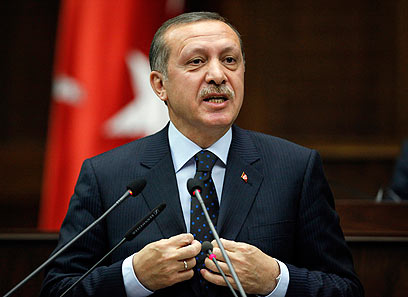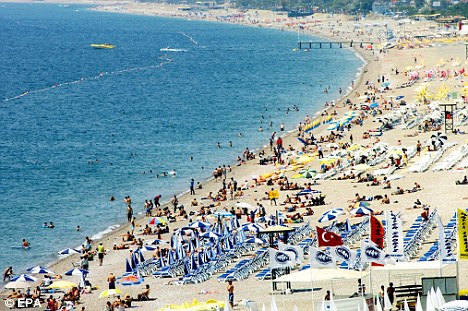Category: Travel
-

“Discover the real Greece. Come to Turkey”
In the article, “and Moreover” penned by Matthew Parris and published in the 12 August 1991 issue of The Times the author accuses Greece of pirating Turkish culture and tourism and he says that Turkish culture and tourism is far superior to Greek. The complete article is given below:Haluk DemirbagTurkish Forum Great BritainAlthough I couldn’t be happier on holiday here, there is a problemabout Turkey. For the turist, it lacks what the PR people would call“a corporate identity”. Japan is cherry blossoms and Mount Fuji, isn’tit? Australia is Kangaroos and Sydney Opera House, Beirut is bombs. Sowhat is Turkey?This matters. Countries, like cigarettes, are sold on broadrecognition. For mass-marketing, a nation needs an image. A touristconcept is at best a fraction of the truth and at worst a complete lie,but it is an important lie. Scotland has been sold for generations on apowerful myth involving kilts, bagpipes and haggis, Israel is currentlyrunning an embarassing campaign depicting the place as a sort ofall-inclusive pizza of New Testament holiness, happy Arabs andskindiving off Eilat. I’m sure it sells.Spain, starting with Carmen, offers us the marketing man’s model:bullfights, cascanets… scant justice to the great spread of peoplesand landscapes that is realy Spain, but potent. The United States showsthat neither the country nor the image need be primitive for promotionunder the banner of a clear corporate identity.And that is Turkey’s tragedy. There was a perfectly marketable andattractive image available-and the Greeks nicked it. A small, relativelyunimportant country on the fringes of big, central, crucial Turkey hasgrapped our attention and elbowed its giant neighbour to the margins.It is one of the best sleights of hand in marketing history.The whole thing has been done on the backs of ancient Greeks and theirruddy Parthenon. But the modern Greeks have little connection with theirancient ones and occupy a different territory, which does happen toinclude Athens. Most of the best Greek ruins, let alone Roman ones, arein Turkey.So the classy handle to the Greek tourist package is fake. Now openthe package. Ouzo, figs and bouzouki music? Much more of all three inTurkey, under different names, Idyllic Mediterranean coast, covesand beaches? Infinitely more of both, and better, in Turkey. Sun-kissedislands? Turkey has these too: and do you know where the Greek ones,which are largely barren, get the produce they sell to tourists asGreek food? White-washed houses with blue doors? Yoghurt? Kebabs?Goat’s milk cheese? All Turkish. Turkish food is similar to, but nicerthan, the “Greek” food we love to eat in London, but find disappointingin Greece. I could go on. The scale of the larcency by which Greece hascorralled for itself the tourist heritage of a whole section of theMediterranean is breathtaking. And they complain about the Elgin Marbles!This is far worse: pirating of cultural copyright. And this, thoughit dwarfs modern Greece, is only the the bottom-left-hand corner ofTurkey we are disscussing. I haven’t touched the Black sea or the regionsof central and eastern Turkey, about which we know next to nothing inBritain.I blame Mrs. Thatcher. There are to many marginal north Londonconstituencies with to many Greek Cypriot voters for Turkey to getso much as a friendly mention in Parliament. There seems to be noTurkish lobby in Britain. And now they are calling it “Greek” coffee!It’ll be Greek Delight next, mark my words, before the Greeks go onto claim little red fezzes and decorated slippers as theirs… oopssorry, a friend tells me the slippers are already sold to tourists onthe Greek islands.You probably think I’ve been got at by the Turkish Tourist Board.Not so. I have simply been poked in the chest in too many barbers andfish and chip shops by the sons and doughters of the Greek Cypriotswho shot at us through the Fifties before settling down to moan thatBritain and the world should protect them from the Turks.The last straw came when, on finding that the best way to get herewas to fly to a neighbouring Greek island and take the ferry to theTurkish mainland, where there is no airport, I was informed thatthe Greeks would confiscate my air ticket if I tried to return the sameway. Are they afraid that tourists who visit Turkey will rumble theGreek Tourist Board conspiracy?If you have time to go to a Greek prison, you might try a test casewith the European Court. Meanwhile, here is a suggested slogan for theTurkish Tourist Board: “Discover the real Greece. Come to Turkey.” -

More Arab tourists visit Turkey after abolishing visa requirements
 (DP-News-World Bulletin)
(DP-News-World Bulletin)Abolishing visa requirements with some countries has driven an exceptional rise in the number of tourists to Turkey, particularly from Arab countries such as Syria, Lebanon and Libya, recent data revealed.
According to data the Tourism Investors Association (TYD) shared with Cihan News Agency, the overall number of tourists from Arab countries to Turkey has risen by almost 50 percent in the first six months of this year over the same period of 2009, a direct result of recently improving relations with countries in the region.
Speaking about the increasing interest of Arab tourists in Turkey, TYD President Turgut Gur says people from Middle Eastern countries tend to prefer vacation hubs such as Istanbul and Antalya; however, the Black Sea region is gradually becoming more popular with these same Arab tourists.
“There has been a remarkable increase in the number of Arab tourists visiting Turkey particularly after the elimination of visa requirements with some countries in the region. One can assume that Arab tourists feel more comfortable in Turkey than in any European country or in the US due to certain cultural and religious similarities,” he suggested.
Along with the elimination of visa requirements, the government’s recent interactions with Israel, due to the ongoing Gaza blockade, and the spread of Turkish soap operas among the Arab population, via satellite TV, has created a positive image for Turkey in the region.
According to Gur the existing Arab tourist potential for Turkey could certainly increase even more if Turkey knows how to “take advantage of it.” “We need to improve our relationship with Arab tourists with such incentives as employing more Arabic-speaking people in tourism facilities,” he suggested. Gur had earlier said he expects the number of Arab tourists to reach 1 million this year.
Businesses attune themselves to Arab tourists’ preferences
Having seen the growing interest in and curiosity about Turkey, tour operators, hotel owners and business owners are looking to hire new employees who can speak Arabic as they want to provide better service and attract as many as Arab tourists as they can, Cuneyt Mengu, the owner of the Mercan tourism agency says. He remarked, “We see that businesses are trying to prepare themselves for this new trend in the Turkish tourism market.”Some shops include product labels in Arabic, while restaurants are preparing menus to suit the tastes of Arab customers. In a unique example, following the recent flocking of Arab tourists to the region, the Trabzon Governor’s Office earlier started a program to train people who can speak Arabic to work at tourist facilities on the city’s Uzungol Plateau, famous for its scenic lake, as well as fresh fish and green scenery. Some Arab entrepreneurs are even considering buying land to build new hotels in the region, stated officials.
“Most Arab tourists that we have served in the past,” Mengu continues, “say they are happy to see people speaking Arabic in Turkey.” Noting that they are happy with the current interest from Arabs, Mengu says their company enjoyed a 15 percent increase in the number of Arab tourists in first six months over the same period of last year.
“We believe the market will see an increase in this number by the end of the year. I call on Turkish entrepreneurs to make good use of such potential,” he added.
Turkish Association of Travel Agents (TURSAB) President Basaran Ulusoy said that Turkey’s potential to attract Arab tourists should be capitalized upon since “these people stay for relatively longer and spend more than average.”
“Turkey is one of the safest and most attractive vacation destinations for the Arab world. Geographical proximity is one other advantage for us,” he said. According to Ulusoy Turkish travel agents have been successful in hosting Arab tourists by using effective advertising campaigns.
, 11/07/2010
-

BP was told of oil safety fault ‘weeks before blast’
A Deepwater Horizon rig worker has told the BBC that he identified a leak in the oil rig’s safety equipment weeks before the explosion.
Tyrone Benton said the leak was not fixed at the time, but that instead the faulty device was shut down and a second one relied on.
BP said rig owners Transocean were responsible for the operation and maintenance of that piece of equipment.
Transocean said it tested the device successfully before the accident.
Meanwhile, BP has said that its costs in tackling the disaster have now risen to $2bn (£1.34bn).
‘

‘Unacceptable
On 20 April, when the Deepwater Horizon rig exploded killing 11 people, the blowout preventer, as the device is known, failed.
The most critical piece of safety equipment on the rig, they are designed to avert disasters just like the oil spill in the Gulf of Mexico.
The blowout preventer (BOP) has giant shears which are designed to cut and seal off the well’s main pipe. The control pods are effectively the brains of the blowout preventer and contain both electronics and hydraulics. This is where Mr Benton said the problem was found.
“We saw a leak on the pod, so by seeing the leak we informed the company men,” Mr Benton said of the earlier problem he had identified. “They have a control room where they could turn off that pod and turn on the other one, so that they don’t have to stop production.”
Professor Tad Patzek, petroleum expert at the University of Texas, was blunt in his assessment: “That is unacceptable. If you see any evidence of the blowout preventer not functioning properly, you should fix it by whatever means possible.”
Mr Benton said his supervisor e-mailed both BP and Transocean about the leaks when they were discovered.
Daily costs
He said he did not know whether the leaking pod was turned back on before the disaster or not.
He said to repair the control pod would have meant temporarily stopping drilling work on the rig at at time when it was costing BP $500,000 (£337,000) a day to operate the Deepwater Horizon.
Henry Waxman, a House of Representatives Democrat who is overseeing congressional investigations into the rig disaster, has accused BP of taking safety shortcuts to save money.
“BP appears to have made multiple decisions for economic reasons that increased the danger of a catastrophic well failure,” Mr Waxman said.
BP chief executive Tony Hayward, giving evidence to Congress, said: “There is nothing I have seen in the evidence so far that suggests that anyone put cost ahead of safety, if there are then we will take action.”
Congress has identified numerous other problems with the blowout preventer, including design problems, unexpected modifications and a flat battery.
Cement job
The other major problems on the rig, Congress has said, centred around the cement job. Cement in an oil well blocks explosive gases from escaping, and it appears the cement may not have set properly on the Deepwater Horizon.
BP said it had indications of a successful cementing operation and the company that was in charge of the cement job, Halliburton, has said it was consistent with that used in similar applications.
Several rig workers the BBC spoke to who were on the Deepwater Horizon said there was pressure in April to work fast.
Work to prepare and then seal the well was behind schedule and had to be completed before a production rig could move in and start turning profits.
“Too many jobs were being done at one time. It should have just really slowed down and just took one job at a time, to make sure everything was done the way it should have been,” said Mr Benton, who is now suing BP and Transocean for negligence.
BP has responded to Mr Benton’s account saying Transocean was responsible for both the maintenance and operation of the blowout preventer.

BBC
-

PETITION FOR TRNC RECOGNITION
KKTC Tanıtma Derneği, 80 bin imza toplamak hedefiyle “Tanınmak İstiyoruz” isimli imza kampanyası başlatıyor. Kıbrıs Barış Harekatı’nın yıldönümü 20 Temmuz’da başlayacak ve 80 gün sürecek olan kampanyada toplanacak imzalar ve tanınma talep eden mektup, “en az yüz kişilik bir kafileyle” New York’a gidilerek Birleşmiş Milletler (BM) Genel Sekreterliği önünde yapılacak basın açıklamasının ardından Genel Sekreter’e sunulacak.KKTC Tanıtma Derneği, 80 bin imza toplamak hedefiyle “Tanınmak İstiyoruz” isimli imza kampanyası başlatıyor.Kıbrıs Barış Harekatı’nın yıldönümü 20 Temmuz’da başlayacak ve 80 gün sürecek olan kampanyada toplanacak imzalar ve tanınma talep eden mektup, “en az yüz kişilik bir kafileyle” New York’a gidilerek Birleşmiş Milletler (BM) Genel Sekreterliği önünde yapılacak basın açıklamasının ardından Genel Sekreter’e sunulacak.Derneğin, bu konuda daha fazla ses getirmek için BM’ye sunulacak imzalarla mektubun eş zamanlı olarak KKTC’nin temsilcilikleri bulunan ülkelerde de dışişleri bakanlarına sunulmasını planlandığı belirtildi.KKTC Tanıtma Derneği Genel Başkanı Efgan Bilgi, kampanyayla ilgili bugün düzenlediği basın toplantısında, “KKTC’nin tanınması sadece Kıbrıs Türkü için gerekli değil, tüm Türk ulusunun başındaki dertlerin tamamının çözümüne en büyük vesile olacaktır” dedi.Bilgi, 80 gün sürecek kampanya çerçevesinde tüm köyleri gezeceklerini ve kampanyayı anlatarak imza toplayacaklarını belirtti.15 Kasım’da imzaların toplanmasının ve hazır olmasının hedeflendiğini söyleyen Bilgi, imzaları derneğin kuruluş yıldönümünde sergileyeceklerini söyledi.Derneğin konseyleşme çalışmalarına da değinen Bilgi, bu yöndeki çalışmaların büyük ilgi gördüğünü ve derneğe bunun için bağışlar yapılmakta olduğunu anlattı.Bilgi, derneğin 17 Temmuz’da genel kurula gideceğini ve yönetim kurulu için üyelik aranmayacağını da belirtti.Derneğin; halkın devlete olan güvenini yükseltmek, adaletli ve demokratik yapıyı korumak, milli gün ve anıları yaşatmak, çağdaş Kıbrıs Türk gencinin dünya ile yarışabilecek bilgi beceride olduğunu göstermek ve tüm tanınma faaliyetlerini bir düzen intizama almak maksadıyla 6 komite kuracağını ifade eden Bilgi, bu komitelerin; “Devlet Alacakları Takip Komitesi”, “Vatandaş Şikayetleri Komitesi”, “Milli Günler ve Organizasyon Komitesi”, “Dış İlişkiler Komitesi”, “Turizm ve Tanıtma Bütçeleri Takip Komitesi” ve “80 Günde 80 Bin İmza ve New York Komitesi” olduğunu dile getirdi.Bilgi, bütün gayretlerinin; halkın devletine sahip çıktığını ve tanınma istediğini tüm dünyaya duyurmak olduğuna vurgu yaparak, herkese kampanyaya katılma çağrısında bulundu. -

‘Commerce is stronger than politics’
Even as Israel-Turkey ties strain to the limit and calls for trade boycotts grow stronger on both sides, industrialists believe financial ties will persevere Tani Goldstein Published: 06.06.10, 08:28 / Israel Business Anti-Israel protest in Ankara Photo: Dudu Azulai  The growing rift between Israel and Turkey following the tragic results of the Gaza aid flotilla raid is beginning to take an immediate toll on the two countries' financial and commercial ties.
On Thursday, Ankara announced it was suspending all of its joint infrastructure projects with Israel, Turkish businessmen are cancelling meetings with Israeli counterparts and it seems tourist activity between the two countries has come to a screeching halt.
Moreover, investment firms like Helman Aldubi announced they were divesting Turkish ventures and many Israelis are calling for a boycott on all Turkish goods. The shekel and the new Turkish Lira (TRY), it seems, have never been so estranged.
The growing rift between Israel and Turkey following the tragic results of the Gaza aid flotilla raid is beginning to take an immediate toll on the two countries' financial and commercial ties.
On Thursday, Ankara announced it was suspending all of its joint infrastructure projects with Israel, Turkish businessmen are cancelling meetings with Israeli counterparts and it seems tourist activity between the two countries has come to a screeching halt.
Moreover, investment firms like Helman Aldubi announced they were divesting Turkish ventures and many Israelis are calling for a boycott on all Turkish goods. The shekel and the new Turkish Lira (TRY), it seems, have never been so estranged.Repercussions Turkey suspends all infrastructure projects with Israel / Shoham Levy, Calcalist Turkish energy minister makes announcement in wake of Gaza flotilla incidentFull story Significant commercial ties
According to the Manufacturers Association of Israel (MAI) and the Israel Export and International Cooperation Institute (IEI), some 900 large Israeli corporations are currently operating in Turkey, mainly in the chemistry, pharmaceutical and medical supplies, software and communication industries; and of course – various defense contractors. Those include some of the biggest companies in Israel, such as Elbit Systems, Israel Chemicals, Israel Aerospace Industries (IAI), Netafim Crop and Israel Oil Refineries (ORL). IMA and IEI data indicate that in 2009, some 1050 small exporters had commercial ties with Turkey and 557 had significant sales in the country. Still, the Industry, Trade and Labor Ministry, IEI and MAI refused to divulge the names of all the Israeli companies trading with Turkey, citing business confidentiality. The decision may also stem from their desire to protect Israeli companies from a possible ban – or worse.Israel's trade with Turkey came to $2.5 billion in 2009, with imports amounting to $1.4 billion and exports amounting to $1.1 billion. Turkey was Israel's 10th largest market in 2009, with exports to it making up 1.6% of Israel's total exports, which came to $67.5 billion. Turkey exported $109.7 billion worth of goods and services in 2009, with 2.2% of it to Israel. Mutual interests will prevail? Anti-Israel rally in Turkey (Reuters)
Mutual interests will prevail? Anti-Israel rally in Turkey (Reuters)
Talks of boycott unrealistic'
"Talking about cutting all ties and a boycott are exaggerated and unrealistic," said Dan Catarivas, MAI's director of Foreign Trade and International Relations. "We have to keep things in proportion. The vast economic ties between the two countries will persevere. The driving interests – on both sides – are stronger than any call against them." Turkey's decision to suspend all joint ventures, he said, "was a government decision… which I'm not so sure can even come to pass, because it contradicts various international treaties Turkey is a part of, like the World Trade Organization, or the OECD – both of which prohibit such bans." Catarivas said that even if Turkey declares an embargo, it would affect only the public sector in Israel, "which is only a small part of Israel's activity in Turkey." Jerusalem and Ankara practice free market policies with an independent, robust business sector that is not subject to government directives, he added. "And since the majority of the activity lies with the business sector, the financial forces will overcome any political pressure." Catarivas believes that the "overall panic, as if Israeli and Turkey are on the verge of severing all ties," is mostly media-made. "I know of no Turkish company that has severed ties with Israeli partners, nor do I know of any Israeli importer or exporter that has decided to do so."Complexities of diplomatic relations
Catarivas said that there is no need to read too much into Ankara's decision to recall its ambassador. "Diplomatic relations have many facets – political, economical, cultural – and they don't always coincide. Israel's political and strategic ties with Turkey are experiencing an obvious crisis; but in many cases, even if diplomatic ties are cut, commercial ties are preserved. "Venezuela recalled its ambassador, Israel had no diplomatic relations with Austria for a year and Jordan and Egypt recall ambassadors on a regular basis, but it's always business as usual." Entangled with the West. Turkish PM Erdogan (Photo: Reuters)
Turkey, he added, is facing a complex situation not only where Israel is concerned, but with the United States and Europe as well. "(Turkish Prime Minister Recep Tayyip) Erdogan's policies are hurting Turkey's ties with the West, but even within his powerbase – and a big part of that is Turkey's new business elite – many have business ties with Israel and their interests are to preserve ties.
"Here too, there are those who are furious with Turkey, but want to preserve business ties."
Entangled with the West. Turkish PM Erdogan (Photo: Reuters)
Turkey, he added, is facing a complex situation not only where Israel is concerned, but with the United States and Europe as well. "(Turkish Prime Minister Recep Tayyip) Erdogan's policies are hurting Turkey's ties with the West, but even within his powerbase – and a big part of that is Turkey's new business elite – many have business ties with Israel and their interests are to preserve ties.
"Here too, there are those who are furious with Turkey, but want to preserve business ties."
Checks and balances
As for concerns that Israeli defense contractors are supplying Ankara with weapons it may one day turn against Israel, Catarivas said he trusts that the defense establishment's system of checks and balances "would prevent Israeli exports from ending up in the wrong hands." Catarivas went on to dismiss claims suggesting maintaining business ties with Turkey would be unpatriotic, maybe even self-serving: "It's in Israel's best interest to maintain business ties with as many markets as possible, Turkey included. "Israel's existence relies on its continued market activity and exports. We employ thousands of people, which bolsters Israel just as much as national pride. "In my opinion, conducting business – even with Turkey – is true patriotism." Chairman Israel-Turkey Business Council Menashe Carmon agrees: "There is a strong interest to preserve commercial relations and they will persevere."What happened will, naturally, have a detrimental effect, but it's too early to say how much damage has been caused. I believe it will turn out to be less severe than we think." He too believed the media contributed to a "sense of catastrophe, which isn’t true… At the end of the day, both parties want trade to continue – so it will."
talkback 
Print 
Send to friend Bookmark to del.icio.us See More 
Turkey suspends all infrastructure projects with Israel 
$1B pledged at Palestinian investment meet


